The original peoples turned to their ancestors for the strength to resist the brutal spectacle that was the House of Representatives voting session on historic cut-off points (marco temporal) for the demarcation of indigenous land.
During the 24 hours preceding the vote on the bill, PL 490, Indigenous people from all over Brazil held vigils in the early morning hours, painted themselves for war and invoked the spirits of their ancestors in their prayer houses. They sang. In their struggle for ancestral lands, they are also fighting for non-Indigenous people. To resist is a verb that they have been conjugating for centuries. To reexist is the only path left open to them in order to avoid climate collapse, a hostile future for future generations of human people, and the complete obliteration of most non-human people. SUMAÚMA recorded these scenes, because it is essential that the collapse be documented.
However, the cry for life has no impact whatsoever on most of those in the National Congress. On Tuesday evening the House of Representatives approved the bill’s main text, by 283 votes to 155, The bill still needs to be considered by the Senate. If the bill becomes law, Congress will have the final say on demarcations. An absolute power that will be granted to the legislative branch, which is currently controlled by denialists, who are inclined to ensure immediate profits for predatory agribusiness, even at the cost of their own children’s quality of life.
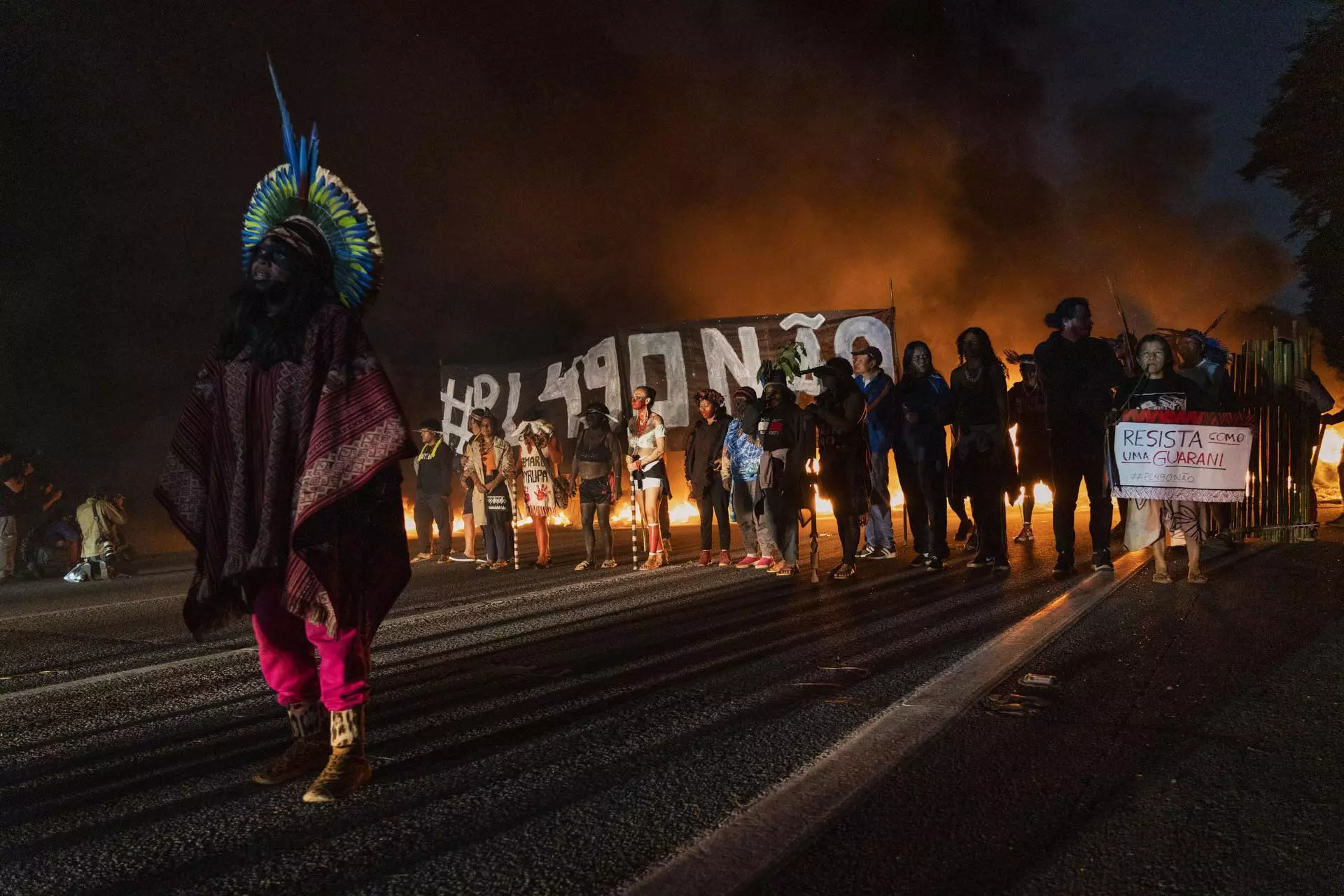
INDIGENOUS PEOPLE OF THE GUARANI TRIBE, IN SÃO PAULO, BEGAN THE RITUALS OF REEXISTENCE ON THE NIGHT OF MONDAY, MAY 29. PHOTO: FERNANDO MARTINHO/SUMAÚMA
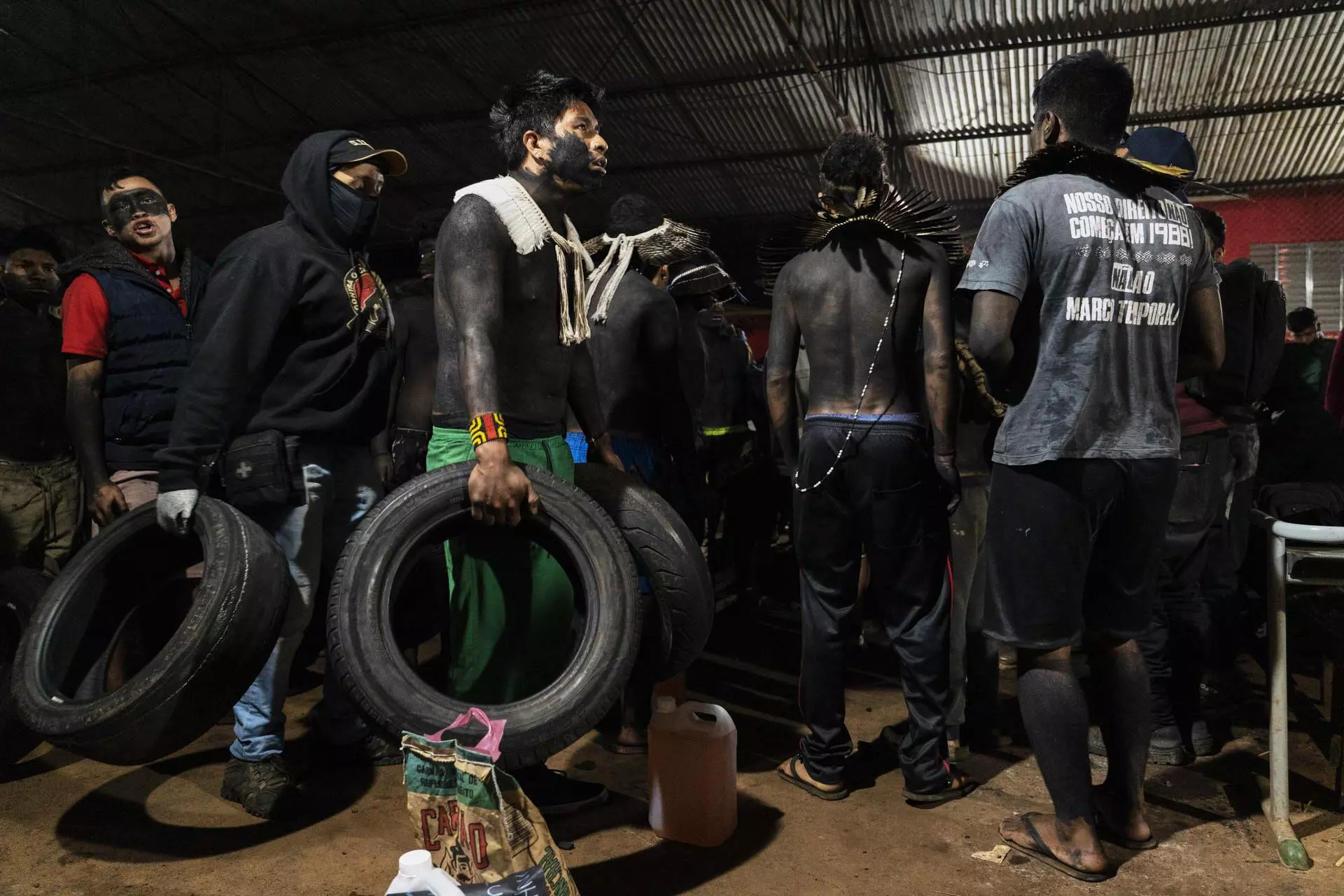
WITH PRAYERS AND PAINTED BODIES, THE GROUPS MARCHED TOWARD THE BANDEIRANTES HIGHWAY. PHOTO: FERNANDO MARTINHO/SUMAÚMA
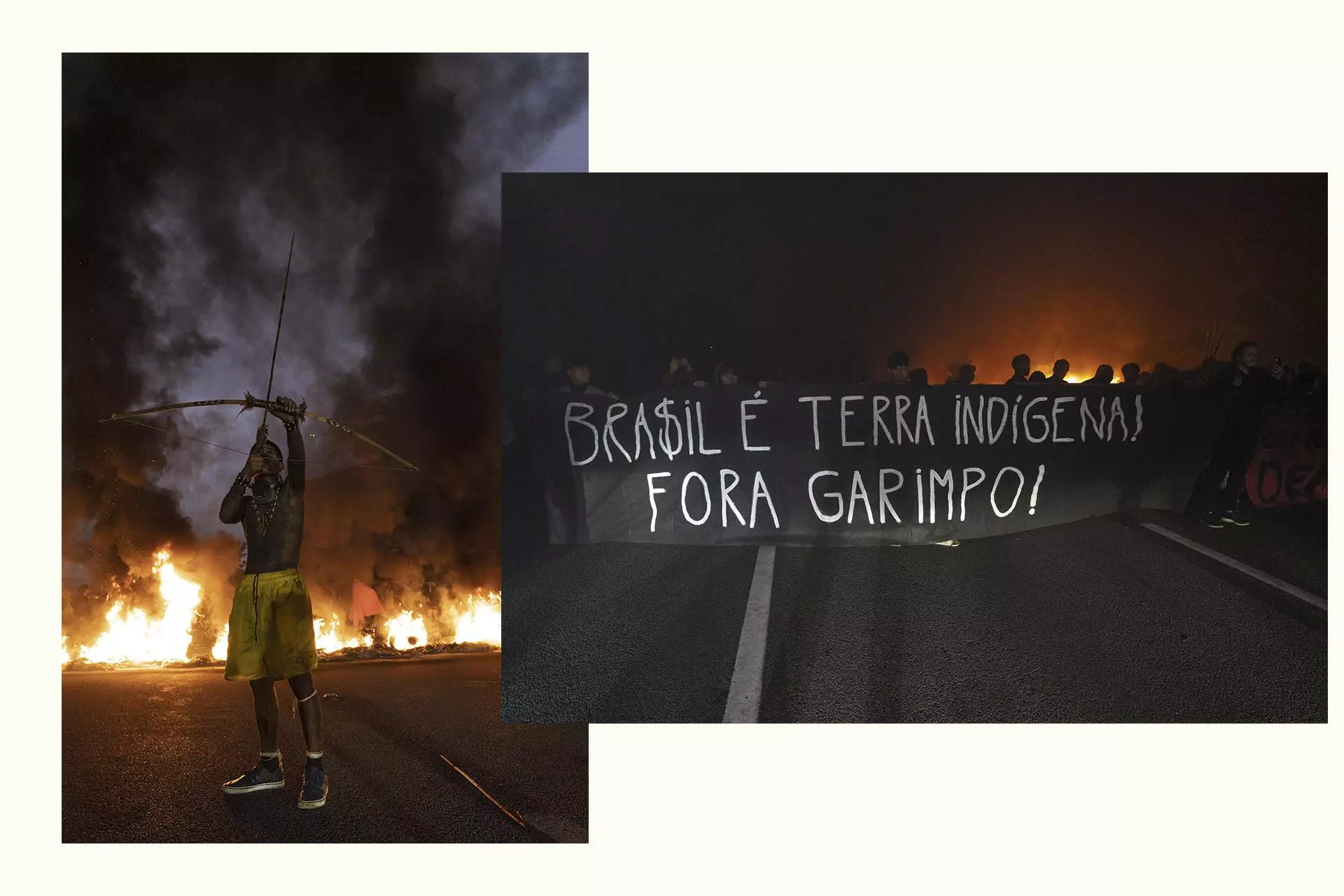
THEY PUT UP A BARRICADE OF TIRES ON THE HIGHWAY AND SET THEM ON FIRE. PHOTOS: FERNANDO MARTINHO/SUMAÚMA
But that’s not all. The text of the bill PL 490 approved by the deputies introduced the concept of historic time limits. What this means is that Indigenous peoples would only be entitled to those areas that they occupied or were already disputing on October 5, 1988, the date of the Constitution’s enactment. Under this ploy, the many peoples who had been expelled from their territories or had to leave them due to the threat of extermination would lose their right to claim their ancestral land. This legal thesis ignores the fact that the corporate-military dictatorship that oppressed Brazil from 1964 to 1985 killed more than 8,000 indigenous people, most of them in the Amazon region, in order to move forward with its so-called “development” projects, and caused the exodus of a number of peoples. Prior to this, other colonization projects marked the forced migration of entire villages.
The Federal Supreme Court has scheduled the vote on historic time limits for Wednesday, June 7. By acting first and approving it in the Lower House, the members of congress seek both to avoid this topic being analyzed in the judicial arena as well as to contrive a confrontation with the Federal Supreme Court. Since the thesis is explicitly unconstitutional, there is a chance that it will be defeated in the Supreme Court, which is likely to continue with the judgment on the scheduled date. In this case, the federal deputies will claim – as they are already doing – that the Supreme Court is offending democracy and will trot out the same old rhetoric of the “dictatorship of the judiciary”. The trick is a well-known one, but it still works with that part of the population that is nothing more than a flock of sheep.
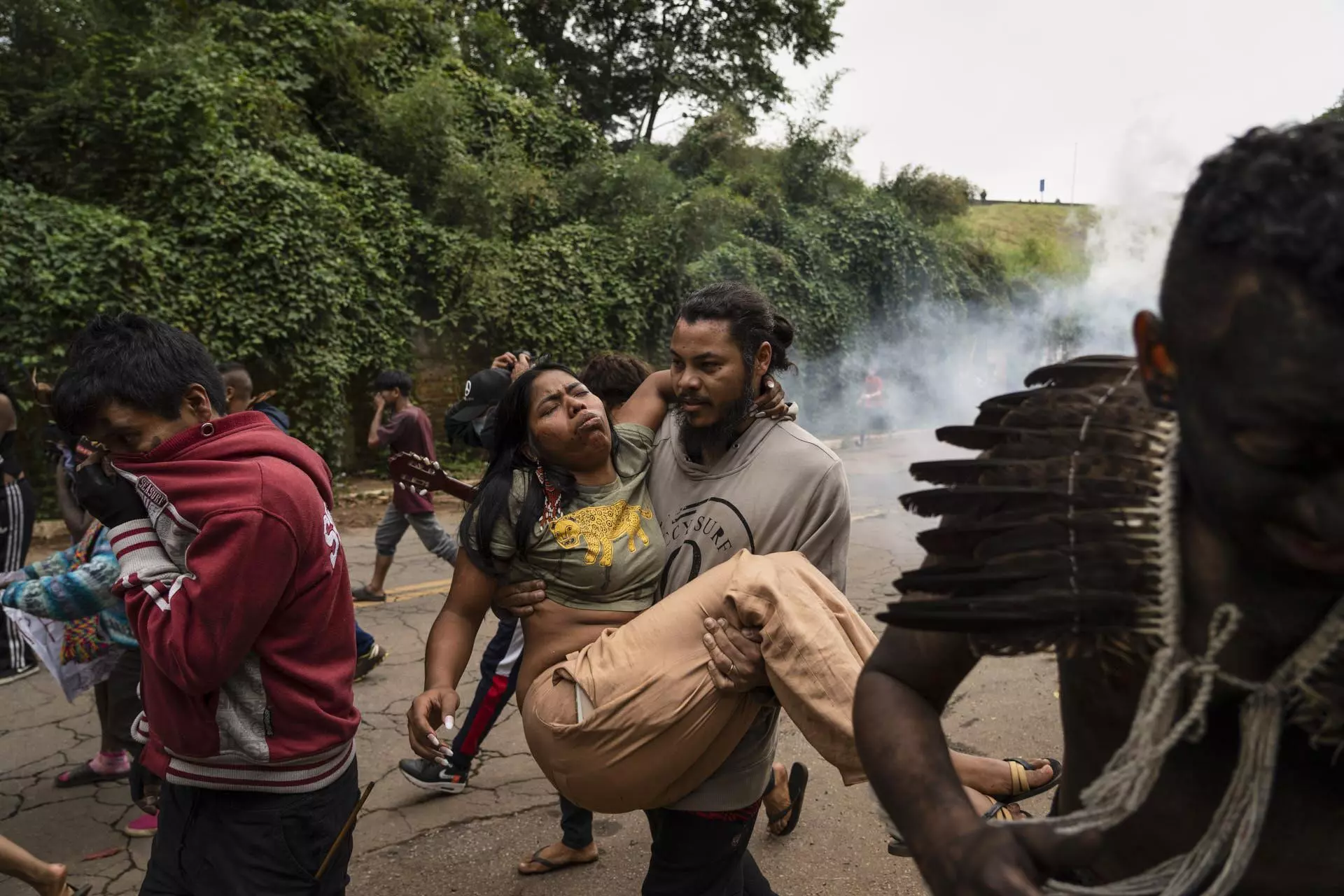
After a round of negotiations, the state of São Paulo’s Military Police’s Riot Squad halted all dialogue and dispersed the Indigenous people with tear gas and rubber bullets. Photo: Fernando Martinho/SUMAÚMA
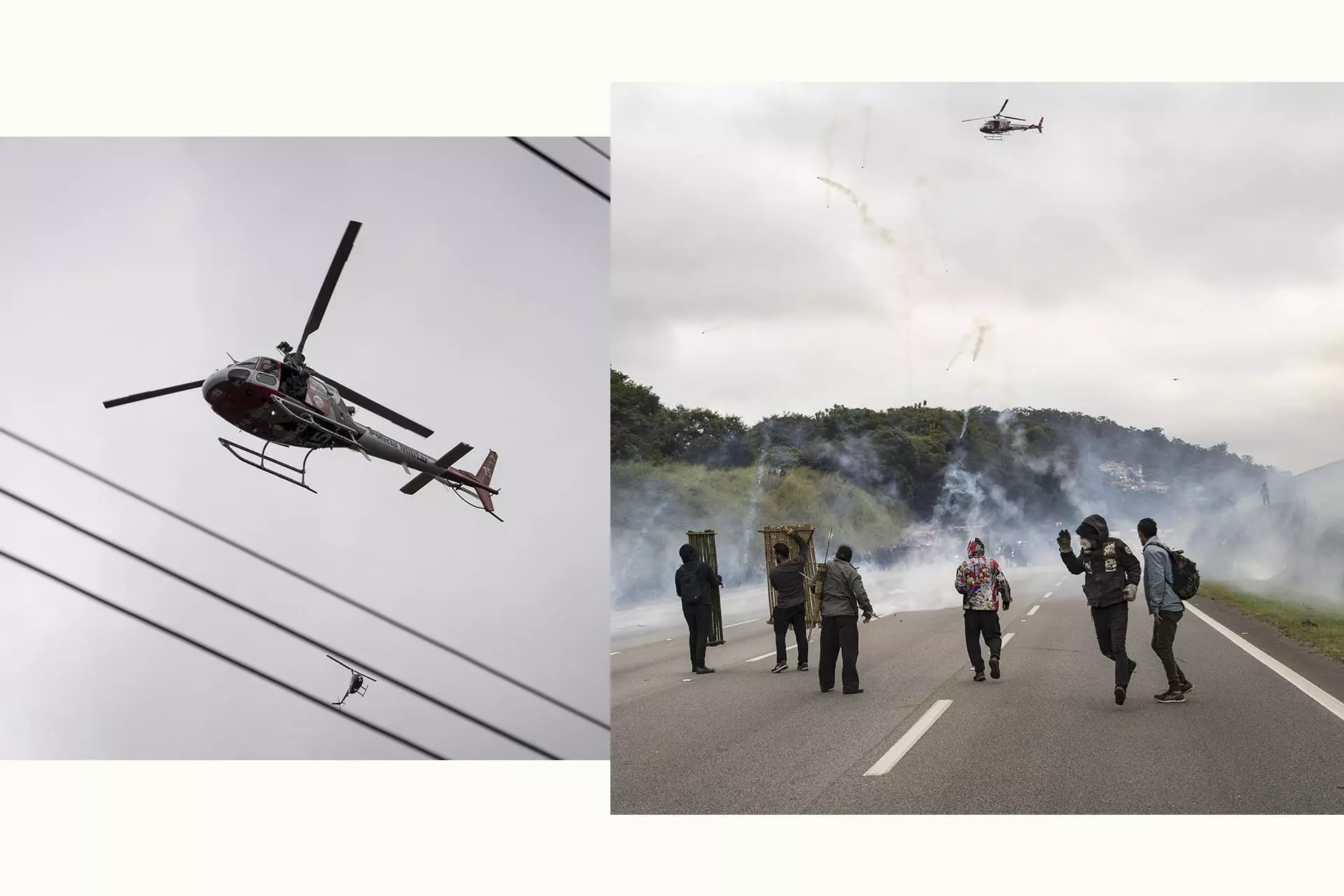
Military Police helicopters were flying low in pursuit of the protesters, knocking down tree branches and putting both Indigenous people as well as journalists at risk. Photos: Fernando Martinho/SUMAÚMA
Relocating for survival
In São Paulo, the main Indigenous protest was organized by the Guarani people from the Tekoa Pyau village on the Bandeirantes highway, one of the main access roads to the state’s capital, which is Brazil’s largest city. The Guarani gathered at 6 p.m. on Monday to begin their reexistence rituals. At around 5:30 a.m. on Tuesday morning, in the freezing cold early hours, with painted bodies, they blocked the highway with tires and set them on fire.
At about 7 a.m. negotiations got underway with the Military Police of São Paulo; a state now governed by the Bolsonaro supporter Tarcísio de Freitas (Republicans Party for the state of São Paulo). The Indigenous people agreed to free up one lane for ambulances and emergency cases. However, when the Military Police’s Riot Squad turned up at 8:30 a.m., all dialogue was halted and the mood became very tense. Four indigenous people were injured, one by rubber bullets and three by tear gas cannisters.
At the same time, a military police helicopter was flying low and chasing the demonstrators who were running back to their villages, scaring the Indigenous children who were at school in the morning. As a result, branches fell from the trees and put the demonstrators and journalists who were following the protest at risk. In a statement, the Military Police alleged that “after three hours of negotiation, the Riot Squad had to take action to disperse the crowds. According to the police account, “no one was arrested and there were no reports of any injuries.”
“There is no justification for subjugating us, once again,” argued the Indigenous man Karai Djekupe. The protesters’ original idea had been to walk to the Marginal Tietê, one of the city of São Paulo’s main freeways. According to Djekupe, his people were advised in dreams to pray to the sick spirit of the Tietê River, which their mother and has become a symbol of pollution.
In Brasilia, Kaingang, Terena, Guajajara, Pankararu, Tikuna, Kayapo, Xikrin, Potiguara, Tuxá, Tukano, Pankará, Kariri-xokó, Satere-mawe and Pataxó-hã-hã-hãe Indigenous people walked from the National Library and Museum of the Republic to the lawn of the so-called Alameda dos Estados (Lane of the States), in front of Congress. There were not many of them, but they were there.
While the Indigenous people tried to make their voices heard by the country, the congressmen and congresswomen defending historic time limits insisted on presenting themselves as the true protectors of the original peoples, with outbursts of utter nonsense: Indigenous people “do not live by eating worms alone,” “have more land than the size of Portugal, “are slaves of the left wing”. “Legal security” and “respect for property” were the two expressions most heard in the speeches of the members of congress who want to have the power to demarcate – or never again demarcate – Indigenous lands.
The federal deputy Célia Xakriabá (Socialism and Liberty Party, for the state of Minas Gerais) painted her hands with red annatto paste, to symbolize that the vote in favor of the historic time limit was not, as many federal deputies claimed, the vote of those who had Indigenous blood in their veins, but of those who had Indigenous blood on their hands. She also stood in the House of Representatives and declared that they were “negotiating away the mother,” referring to mother Earth.
In trampling over the indigenous peoples’ rights, the federal deputies have once again driven a steamroller over the Amazon region and all the enclaves of nature that still resist. The men in suits did not just trample on the future, but also on intelligence. The fragility of their speeches, the denialism dressed up as information and the ignorance proudly yelled out was apocalyptic. All powerful, most of the federal deputies don’t even seem to realize that they are digging a bottomless pit.
The president of the Lower House, Arthur Lira (PP-AL), at the height of his power, described it with his customary cynicism: “The majority always wins over the minority. The federal deputy Érica Kokay (Workers’ Party for the Federal District) summed up the vote: “Absurd people have definitely lost all sense of shame in Brazil.”
Translation into Spanish: Meritxell Almarza
English translation: Mark Murray
Photography editing: Marcelo Aguilar, Mariana Greif and Pablo Albarenga
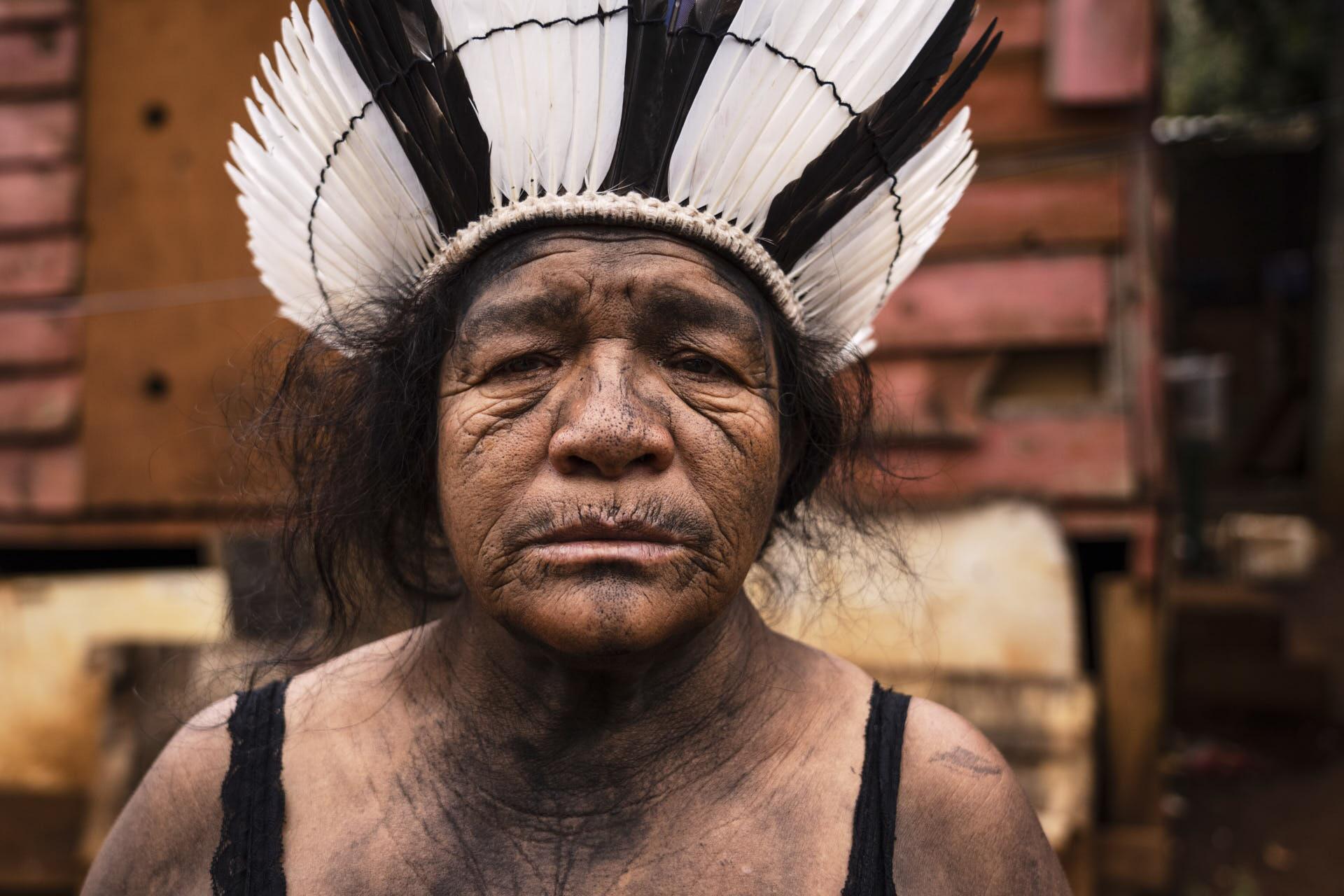
Ara Poty accused the government of the state of São Paulo of being an enemy of the indigenous people who, according to her, were engaged in a peaceful protest against the timeframe thesis. Photo: Fernando Martinho/SUMAÚMA
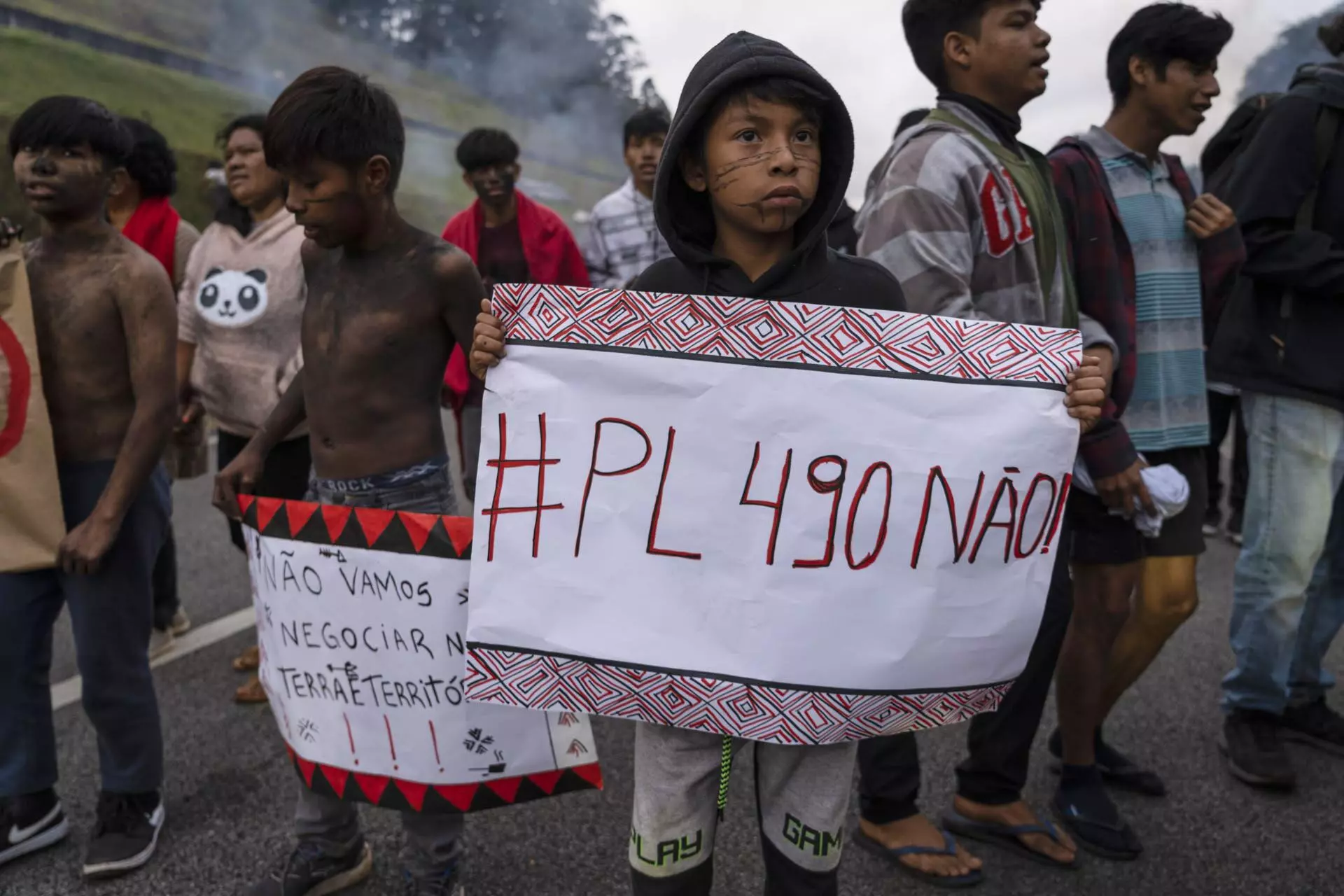
Children of the Guarani people also joined in the protests against the timeframe thesis, on the Bandeirantes Highway. Photo: Fernando Martinho/SUMAÚMA
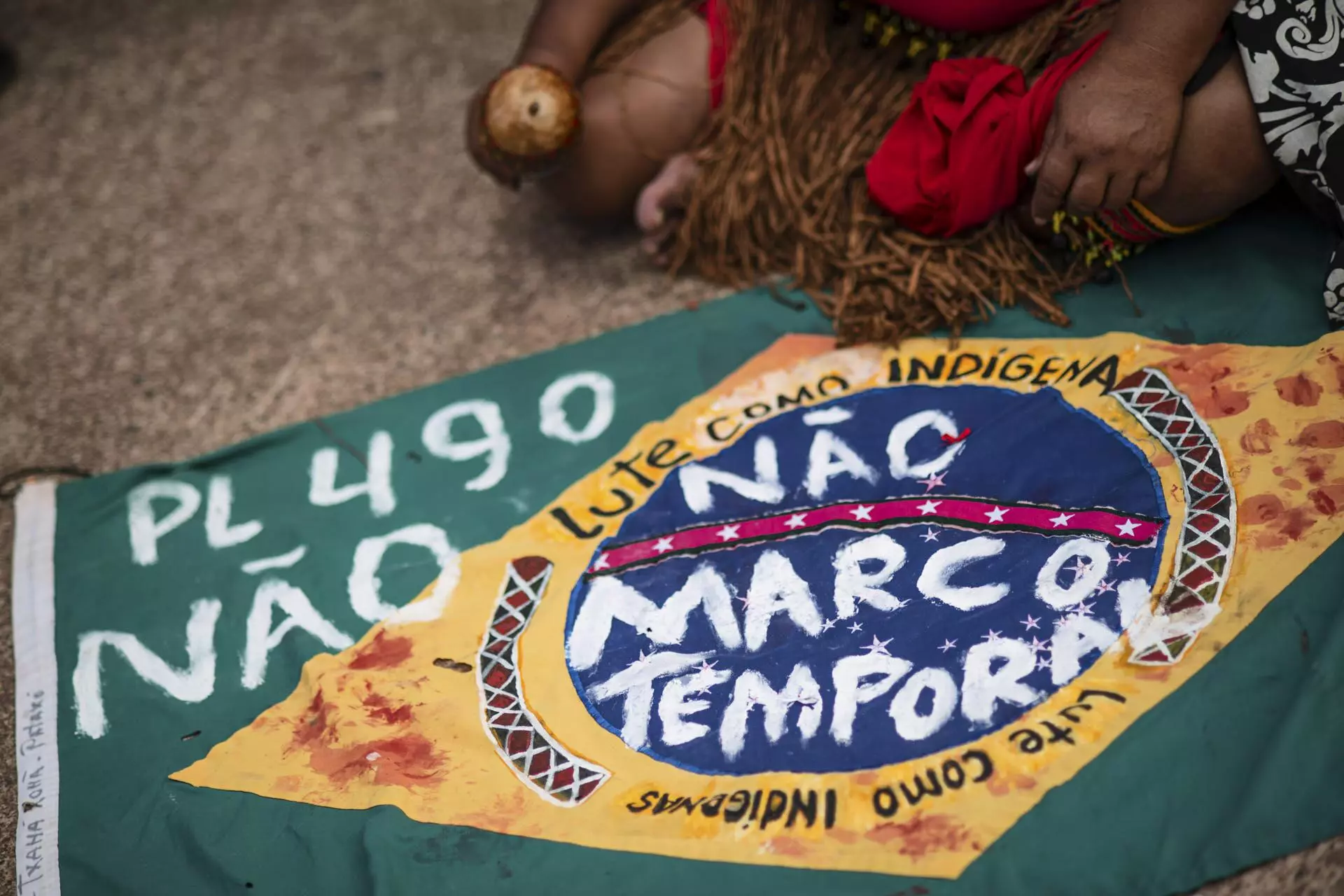
The halting of the demarcation processes is one of the most significant impacts of the timeframe thesis for the Indigenous people. Photo: Matheus Alves/SUMAÚMA
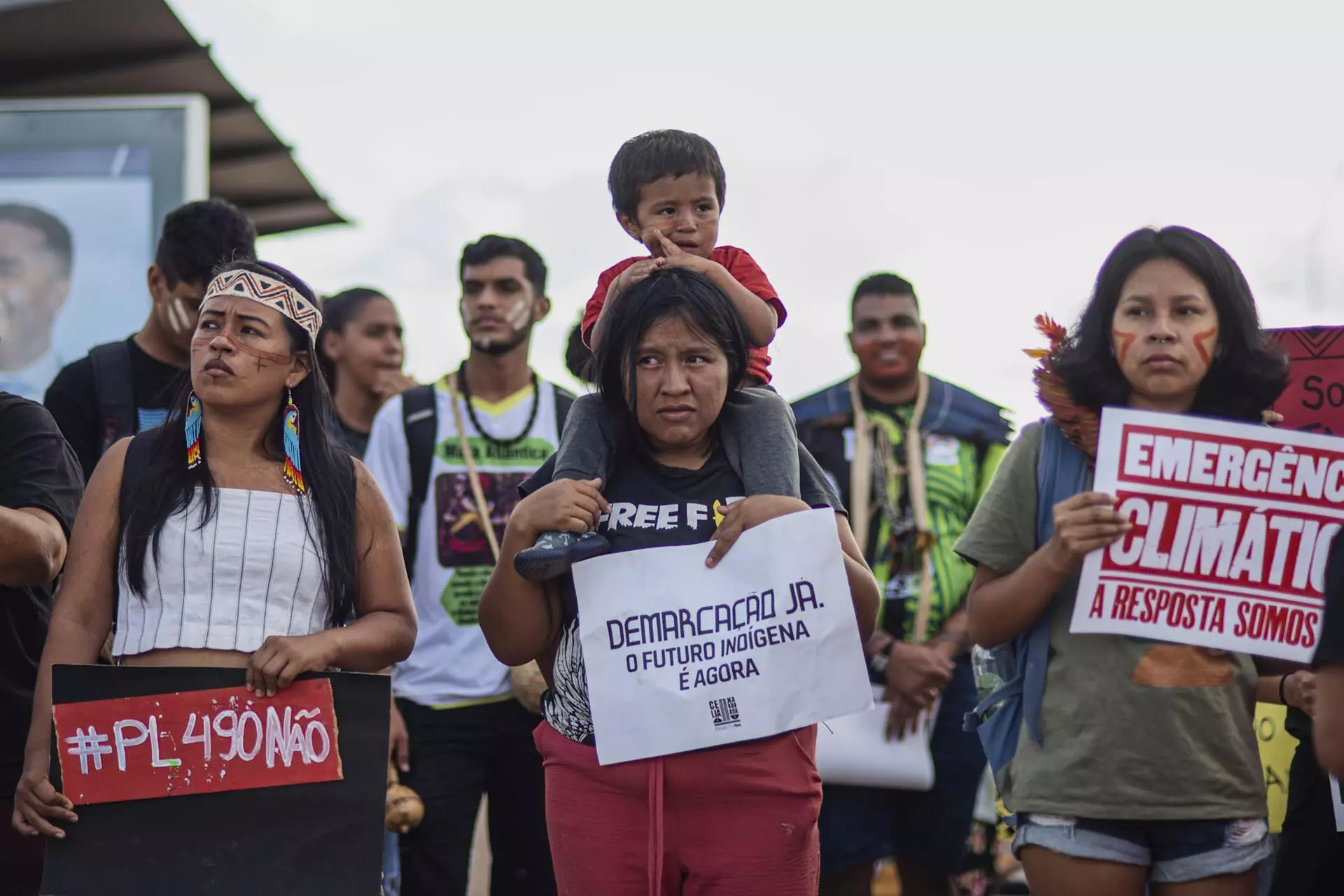
The timeframe thesis represents a setback in the defense of the original peoples’ rights to their territories. Photo: Matheus Alves/SUMAÚMA

Using their cellphones young people in Brasilia follow live, the federal deputies’ votes on the timeframe thesis Bill. Photo: Matheus Alves/SUMAÚMA
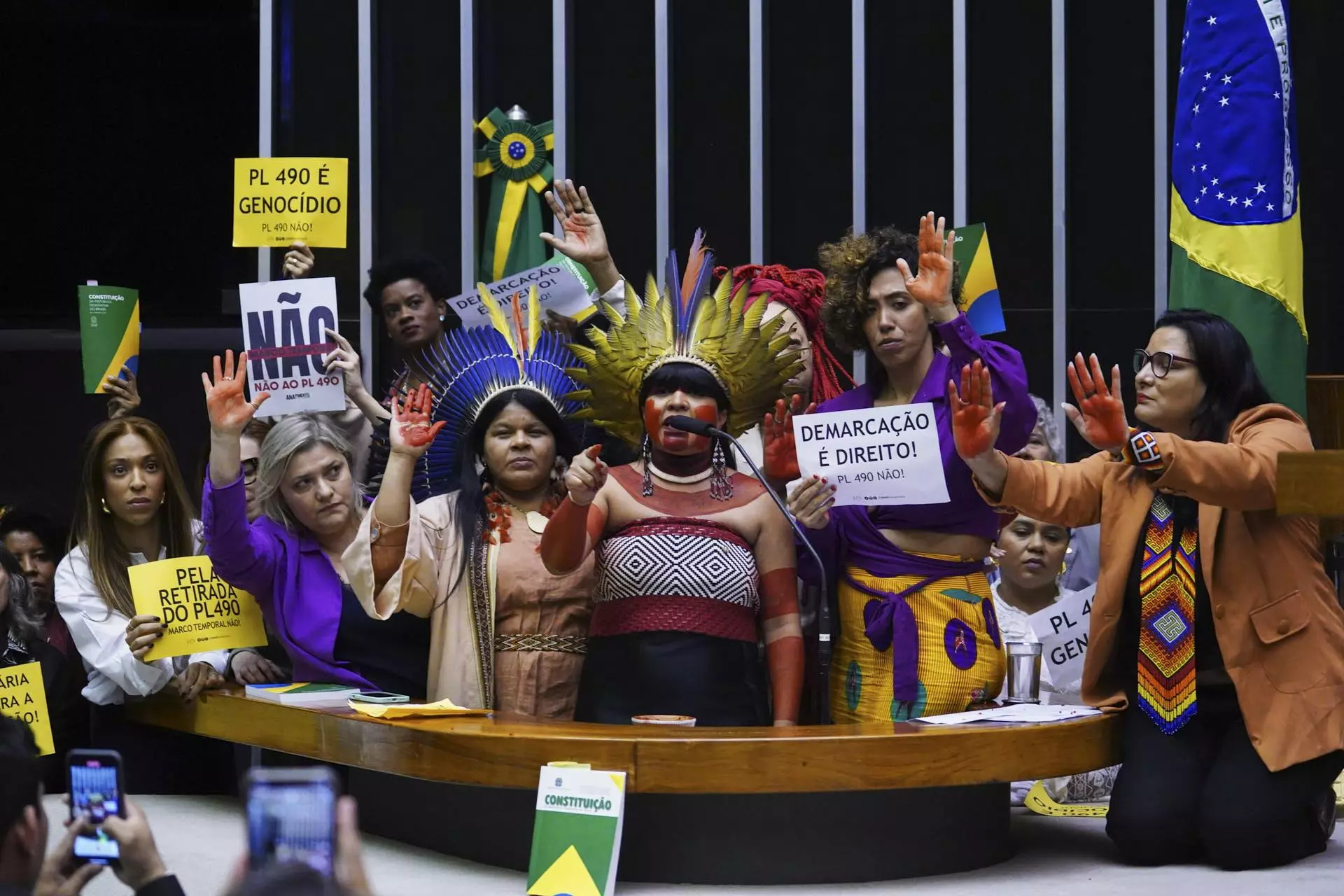
Federal Deputy Célia Xakriabá (at the microphone): the red colored annatto paste used for the protest symbolizes Indigenous blood on the hands of those who defend the timeframe thesis. Photo: Pablo Valadares/House of Representatives
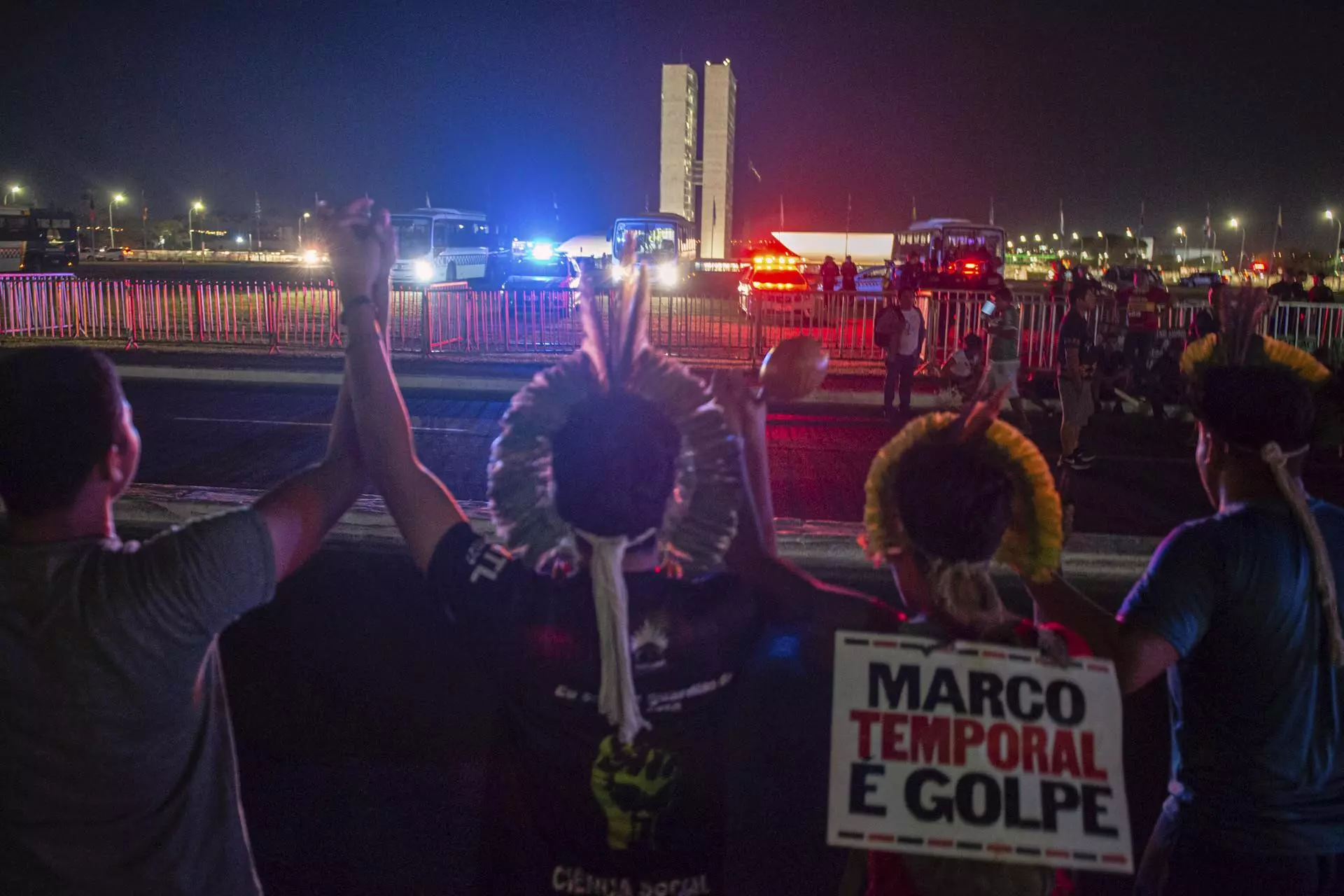
Indigenous leaders, prevented from getting close to Congress, held a vigil in front of the building, awaiting the outcome of the vote. Photo: Matheus Alves/SUMAÚMA





